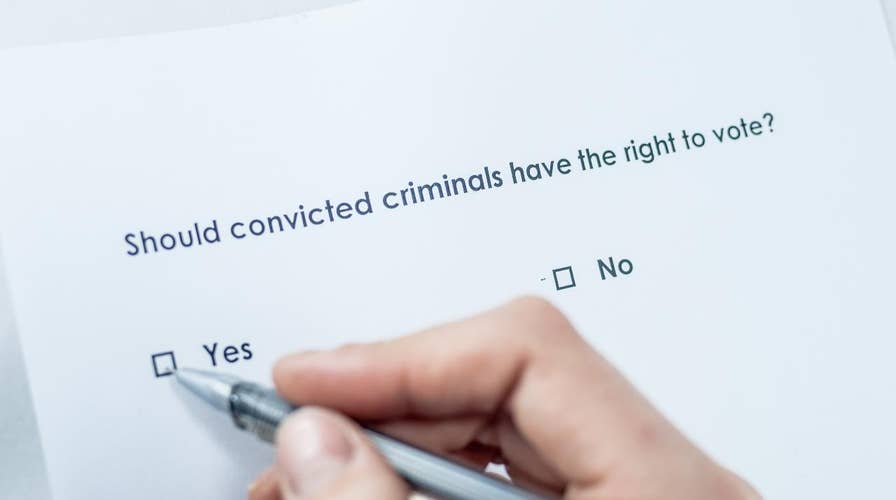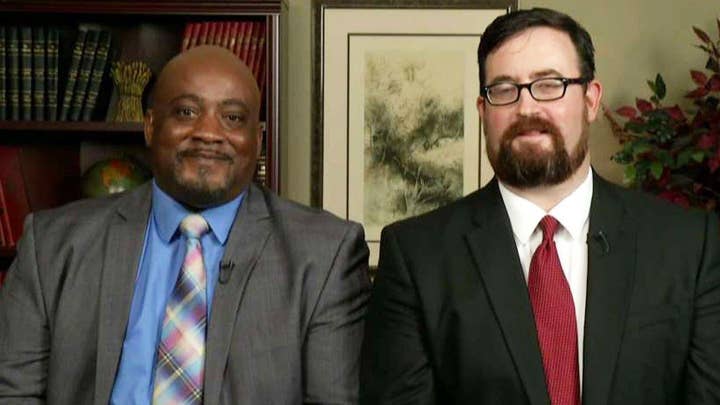Felons voting rights on the Florida ballot this November
The Voting Restoration Amendment, or Amendment 4, is on the ballot in Florida this November. If passed, it will reclaim voting rights for convicted felons. Here is what you need to know.
More than 1.5 million Florida residents are barred from voting in state elections for the rest of their lives, because of a tough law that permanently revokes voting rights for anyone convicted of a felony.
But a measure on the November ballot could change that, allowing those who have served their time to cast votes as soon as the 2020 elections.
The “Voting Restoration Amendment,” also called Amendment 4, was approved to be on the ballot back in January after gathering the requisite 766,200 signatures and would automatically restore voting rights to felons – murderers and sex offenders not included – who have done prison time, completed parole or probation and paid any restitution. Florida’s ballot measure is part of a broader move over the last few decades to restore voting rights to felons, but is the first to put it to voters to decide.
“This would move Florida out of being an outlier and more into the mainstream,” Myrna Pérez, deputy director of the Brennan Center for Justice's Democracy Program, told Fox News. “This follows the general trend we have seen in recent years.”
Critics of these laws claim they are designed to keep black voters from the polls.
Democratic governors in states like New York and Virginia have issued executive orders re-enfranchising people with felony records, while lawmakers in places such as Maryland and New Jersey have passed or are considering pushing measures through the statehouse to restore voting rights.
Supporters of current law, however, point out that people who have committed felonies must demonstrate they are truly reformed before regaining the right to vote.
"It is important that this form of clemency be granted in a deliberate, thoughtful manner that prioritizes public safety and creates incentives to avoid criminal activity," Florida Gov. Rick Scott said during a discussion on clemency back in 2011.
Restoring voting rights has come with pitfalls in the past, like when a cop killer released from prison got voting rights restored, thanks to a recent New York parole board decision and Gov. Andrew Cuomo's move to issue conditional pardons to thousands of parolees.
Currently, Florida does have a process in which convicted felons can have voting rights restored, but critics of the current system argue it is too lengthy and burdensome for many ex-cons to navigate.
Along with a backlog of more than 10,000 applications in the state agency that processes the applications, people looking to have their rights restored must travel to Tallahassee to appear before the Board of Executive Clemency, composed of Gov. Scott, Attorney General Pam Bondi, Agriculture Commissioner Adam Putnam and Chief Financial Officer Jimmy Patronis.
In April, Scott – who is currently in a tight Senate race against incumbent Democrat Bill Nelson – along with other Florida officials appealed a federal judge’s ruling that the state’s system for restoring voting rights to former prisoners is unconstitutional. They eventually secured a stay of the order.
Amendment 4 needs to garner at least 60 percent of the vote to pass this November.
“Voters took matters in their own hands to ensure that their fellow Floridians, family members and friends who’ve made past mistakes, served their time and paid their debts to society are given a second chance and the opportunity to earn back their ability to vote,” Desmond Meade, chairman of Floridians for a Fair Democracy, said in a statement back in January.
While the trend over the last few decades has been to restore voting right to felons, the restoration of other rights for felons – such as being able to run for office – have not followed.
Much like voting rights, the question of whether or not a convicted felon can hold office once released from prison varies widely from state to state. In some states, felons whose conviction is older than 10 years may hold public office, but other states maintain that anyone convicted of a crime of moral turpitude may not serve in an elected position.
These discrepancies are the reason why everyone from a convicted pedophile in Virginia to half of Detroit’s mayoral candidates can run for office.
In Louisiana, voters this fall also will be asked whether they think felons should be prohibited from either seeking or holding public office for five years after their sentences have been served.
The state, which recently passed legislation permitting felons to vote in elections after five years as long as they weren’t imprisoned for election fraud or other such offenses, is looking to revise a similar amendment from 1998 that barred felons from seeking office for 15 years. The Louisiana Supreme Court overturned that provision in 2016, saying voters approved a version differing from one lawmakers passed.
In prior years, House lawmakers have supported longer waits for felons, but couldn't win Senate agreement. The five-year provision is a compromise.







